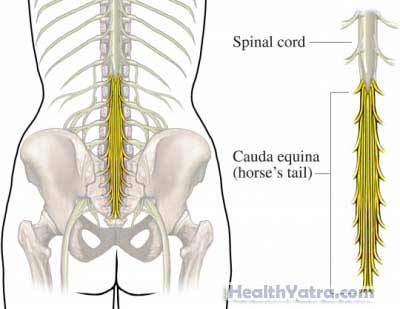تعريف
Cauda equina syndrome (CES) occurs when the nerve roots at the base of the spinal cord are compressed. Known as the cauda equina (“horse’s tail” in Latin), this bundle of nerves governs the sensation and function of the bladder, bowel, sexual organs, and legs. CES is a medical emergency. If treatment is not initiated to relieve pressure on the nerves, function below the waist may be lost.

أسباب
A common cause of CES is injury of a spinal disk on the nerve roots. A spinal disk is a semi-soft mass of tissue that rests between the bones of the spine. These bones are known as the vertebrae. The disks act as the spine’s shock absorbers. When a disk spills out into the spinal canal, it can press against the bundle of nerves, causing CES. This syndrome may also be caused by:
- Accident that crushes the spine (eg, a car accident or fall)
- Penetrating injury (eg, a knife or gunshot wound)
- Arthritis (eg, ankylosing spondylitis)
- Complications from spinal anesthesia
- Mass lesion (eg, blood clot)
- Complications from cancer
- Side effect of medicine
عوامل الخطر
These factors increase your chance of developing CES. Tell your doctor if you have any of these risk factors:
- History of back problems (eg, lumbar spinal stenosis)
- Degenerative disk disease
- Birth defects (eg, narrow spinal canal, spina bifida)
- Hemorrhages affecting the spinal cord
- Arteriovenous malformation
- Spinal surgery or spinal anesthesia
- Lesion or tumor affecting the spinal bones or cerebrospinal fluid (CSF)
- Infection affecting the spine
- Possibly, manipulation of the lower back
الأعراض
If you have any of these symptoms do not assume it is due to CES. These symptoms may be caused by other conditions. Tell your doctor right away if you have any of these:
- Severe low back pain
- Numbness, tingling in crotch area (called saddle anesthesia/paresthesia)
- Inability to urinate, or to hold urine or feces
- Inability to walk, or dragging of foot
- Weakness, loss of sensation, or pain in one or both legs
- Sexual dysfunction (eg, in men, inability to get an erection)
CES requires urgent surgery. If you have any of the above symptoms, get emergency care.
التشخيص
Your doctor will ask about your symptoms and medical history. He will also do a physical exam. He may do a neurological exam, which includes testing reflexes, vision, mental status, and strength. A rectal exam may be done to assess sphincter function.
Your doctor may order these tests:
- MRI scan —a test that uses magnetic waves to make pictures of structures inside the brain and spinal cord
- CT scan —a type of x-ray that uses a computer to make pictures of structures inside the head and spinal cord
- Myelogram —imaging test that uses a special dye to view the spinal cord and the area surrounding it
- Electromyography —measures and records the electrical activity of a muscle
If have CES, you may need emergency treatment.
العلاج
التحدث مع طبيبك حول خطة العلاج الأفضل بالنسبة لك. خيارات العلاج ما يلي:
- Surgery options:
- Laminectomy —a surgical procedure to remove a portion of a vertebra, called the lamina
- Diskectomy —a surgical procedure to remove part of an intervertebral disk that is putting pressure on the spinal cord or nerve root
- Radiation therapy —If CES is due to cancer, radiation therapy may be an option.
Your doctor may also treat the underlying cause of CES.
Follow-up Care
The long-term effects of CES can range from mild to severe. Problems may include:
- صعوبة في المشي
- Problems with bladder and bowels
- Sexual dysfunction
- الشلل
Your follow-up care may involve working with a:
- Physical therapist
- Occupational therapist
- طبيب أعصاب
- Incontinence specialist (if you have lost bladder control)
الدواء
Your doctor may prescribe medicine for:
- الألم
- Bladder and bowel difficulties
الوقاية
There is no way to prevent CES.
